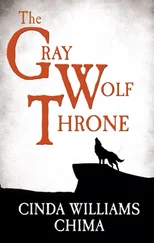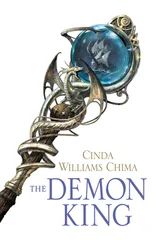Though it was prime traveling season, they’d met little trade traffic along the trail— only a few hollow- eyed refugees from Arden’s civil war.
Dancer pointed ahead, toward the southern slope. “Lord Demonai says that before the war, the wagon lines ran from morning to night in season, carrying trade goods up from the flatlands. Food, mostly— grain, livestock, fruits, and vegetables.”
Dancer had traveled through Marisa Pines Pass before, on trading expeditions with Averill Lightfoot, trademaster and patriarch of Demonai Camp.
“Now the armies swallow it up,” Dancer went on. “Plus, a lot of the cropland has been burned and spoiled, so it’s out of production.”
It will be another hungry winter in the Fells, Han thought. The civil war in Arden had been going on for as long as Han could remember. His father had died there, serving as sell- sword to one of the five bloody Montaigne princes— all brothers, and all laying claim to the throne of Arden.
Han’s pony wheezed and blew, after the long climb from Marisa Pines Camp. The air was thin at this altitude. Han combed his fingers through the shaggy pony’s tangled mane, and scratched behind his ears. “Hey, now, Ragger,” he murmured. “Take your time.” Ragger bared his teeth in answer, and Han laughed.
Han took a proprietary pride in his ill- tempered pony— the first he’d ever owned. He was a skilled rider of borrowed horses. He’d spent every summer fostered in the upland lodges— sent there from the city by a mother convinced he carried a curse.
Now everything was different. The clans had staked him his horse, clothing, supplies, food for the journey, and paid his tuition for the academy at Oden’s Ford. Not out of charity, but because they hoped the demon- cursed Han Alister would prove to be a potent weapon against the growing power of the Wizard Council.
Han had accepted their offer. Accused of murder, orphaned by his enemies, hunted by the Queen’s Guard and the powerful High Wizard, Gavan Bayar, he’d had no choice. The pressure of past tragedies drove him forward— the need to escape reminders of his losses, and the desire to be somewhere other than where he’d been.
That, and a smoldering desire for revenge.
Han slid his fingers inside his shirt and absently touched the serpent amulet that sizzled against the skin of his chest. Power flowed out of him and into the jinxpiece, relieving the magical pressure that had been building all day.
It had become a habit, this drawing off of power that might otherwise pinwheel out of control. He needed to constantly reassure himself the amulet was still there. Han had become strangely attached to it since he’d stolen it from Micah Bayar.
The flashpiece had once belonged to his ancestor, Alger Waterlow, known by most people as the Demon King. Mean -while, the Lone Hunter amulet made for him by the clan matriarch, Elena Demonai, languished unused in his saddlebag.
He should hate the Waterlow flashpiece. He’d paid for it with Mam’s and Mari’s lives. Some said the amulet was a black magic piece— capable of naught but evil. But it was all he had to show for his nearly seventeen years, save Mari’s charred storybook and Mam’s gold locket. They were all that remained of a season of disaster.
Now he and his friend Dancer were to travel to Mystwerk House, the charmcaster academy at Oden’s Ford, and enter training as wizards under sponsorship of the clans.
“Are you all right?” Dancer leaned toward him, his copper face etched with concern, his hair twisting in the wind like beaded snakes. “You look witch- fixed.”
“I’m all right,” Han said. “But I’d like to get out of this wind.” Even in fair weather the wind roared constantly through the pass. And now, at summer’s end, it carried the bite of winter.
“The border can’t be far,” Dancer said, his words snatched away as he spoke them. “Once we cross, we’ll be close to Delphi. Maybe we can sleep under a roof tonight.”
Han and Dancer traveled under the guise of clan traders, leading pack ponies loaded with goods. Their clan garb offered some protection. That and the longbows slung across their backs. Most thieves knew better than to confront members of the Spirit clans on their home ground. Travel would be riskier once they crossed into Arden.
As they descended toward the border, the season rolled back, from early winter to autumn again. Past the tree line, first scrubby pines and then the aspen forest closed in around them, providing some relief from the wind. The slope gentled and the skin of soil deepened. They began to see scattered crofts centered by snug cottages, and meadows studded by sturdy mountain sheep with long, curling horns.
A little farther, and here was evidence of the festering war to the south. Half hidden among the weeds to either side of the road were discards— empty saddlebags and parts of uniforms from fleeing soldiers, household treasures that had become too much of a burden on the uphill trail.
Han spotted a child’s homespun dolly in the ditch, pressed into the mud. He reined in, meaning to climb down and fetch it so he could clean it up for his little sister. Then he remembered that Mari was dead and had no need of dollies anymore.
Grief was like that. It gradually faded into a dull ache, until some simple sight or sound or scent hit him like a hammer blow.
They passed several torched homesteads, stone chimneys poking up like headstones on despoiled graves. And then an entire burnt village, complete with the skeletal remains of a temple and council house.
Han looked at Dancer. “Flatlanders did this?”
Dancer nodded. “Or stray mercenaries. There’s a keep at the border, but they don’t do a very good job patrolling this road. The Demonai warriors can’t be everywhere. The Wizard Council claims wizards could take up the slack, but they’re not allowed and they don’t have the proper tools, and that’s the fault of the clans.” He rolled his eyes. “As if you’d find wizards out here in the rough even if they were allowed to be.”
“Hey, now,” Han said. “Watch yourself. We’re wizards in the rough.”
They both laughed at the double joke. They’d come to share a kind of graveyard humor about their predicament. It was hard to let go of the habit of making fun of the arrogance of wizards— the kinds of jokes the powerless make about the powerful.
They reached a joining of trails from the east and west, all funneling into the pass. Traffic thickened and slowed like clotted cream. Travelers trickled past, heading the other way, toward Marisa Pines and likely on to Fellsmarch. Men, women, children, families, and single travelers, groups thrown together by chance, or joined together for protection.
Loaded down with bundles and bags, the refugees were silent, hollow- eyed, even the children, as if it took everything they had to keep putting one foot in front of the other. Adults and younglings alike carried clubs, sticks, and other makeshift weapons. Some were wounded, with bloodstained rags tied around their heads or arms or legs. Many wore lightweight flat-lander clothing, and some had no shoes.
They must have left Delphi at daybreak. If it had taken them this long to get this distance, they were never going to make it through the pass by nightfall. Then it was two more days to Marisa Pines.
“They’re going to freeze up there,” Han said. “Their feet will be cut to ribbons on the rocks. How are the lytlings going to manage the climb? What are they thinking?”
One little boy, maybe four years old, stood crying in the middle of the trail, fists clenched, face squinched up in misery. “Mama!” he cried in the flatlander tongue. “Mama! I’m hungry!” There was no mama in sight.
Pricked by guilt, Han dug into his carry bag and pulled out an apple. He leaned down from his saddle, extending it toward the boy. “Here,” he said, smiling. “Try this.”
Читать дальше












